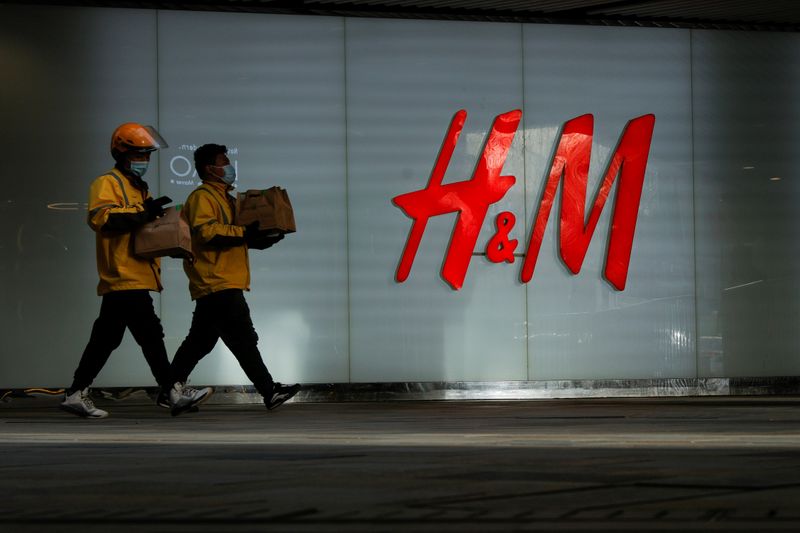By Ross Kerber and Victoria Waldersee
BOSTON/LISBON (Reuters) - A group of religious and socially conscious investors and other funds are ramping up pressure on Western companies over alleged human rights abuses in China's Xinjiang region, highlighting the challenges for brands trying to maintain their business ties amid rising tensions.
The group of more than 50 investors, backed by the Interfaith Center on Corporate Responsibility, said it is in the process of contacting more than 40 companies, including H&M, VF Corp (NYSE:VFC), Hugo Boss and Zara-owner Inditex (MC:ITX), requesting more information about their supply chains and urging them to quit situations that could lead to human rights abuses.
Anita Dorett, program director for the Investor Alliance for Human Rights, which put together the request to the fashion brands and other big corporate names, said she was worried that some companies had moved to scrub language about policies on forced labour from their websites, or pledged to buy more cotton from Xinjiang, in fear of a backlash from Chinese social media and companies.
"Companies do not prioritise resources to digging into their supply chains and mapping them out. As investors, we want transparency and accountability," Dorett said in an interview. She added that "This is their business. If they don't know what's happening, who will?"
'COMMERCIAL RETALIATION'
Over the past week, H&M, Burberry, Nike (NYSE:NKE), Adidas (OTC:ADDYY) and other Western brands have been hit by consumer boycotts in China after raising concerns about forced labour in Xinjiang.
The wave of boycotts coincided with sanctions imposed by Britain, Canada, the European Union and the United States over what they say are human rights abuses taking place in Xinjiang.
China denies all accusations of abuse.
The investor alliance alleged that companies removing or moving statements in relation to Xinjiang were doing so in fear of commercial retaliation from the Chinese government. It also said compliance rules were being developed in other markets, including the European Union, obliging them to fully disclose their supply chains.
The Human Rights section of H&M’s website hmgroup.com on Friday no longer carried a link to a 2020 statement on Xinjiang. The statement could still be accessed through the page’s direct address.
Inditex's statement on forced labour on its website was no longer available as of last Thursday.
H&M and Inditex did not immediately respond to a Reuters request for comment on the investor group's approach.
H&M has declined to comment on the removal of details from its website. Inditex has not responded to requests to comment on removal of information from its website.
VF Corp's original statement on Xinjiang was no longer available, with a new statement published on a different section of the site. A VF spokeswoman said on Tuesday the company had "not changed our position, our policies or our practices" but did not address the new location of its statement.
Hugo Boss said last week on Chinese social media that it would continue sourcing Xinjiang cotton. Company spokeswoman Carolin Westermann said on Friday an undated English-language statement on its website stating that "so far, HUGO BOSS has not procured any goods originating in the Xinjiang region from direct suppliers" was its official position and that the Chinese statement was not authorised.
Westermann reiterated the company's position on Tuesday, adding that it was in "active exchange with NGOs and other key stakeholders, including investors, to outline our standards, values and sustainability initiatives in more detail."
GROWING PRESSURE
Among investors, environmental, social and governance funds have taken in big inflows of cash, putting companies on the spot and prompting new financial disclosures on topics that were once considered fringe issues best left to governments to address.
Assets in sustainable funds hit a record $1.7 trillion in 2020, based on data from fund management industry tracker Morningstar.
The Investor Alliance for Human Rights has more than 160 institutional investors and other organisations as members, representing more than $5 trillion in assets under management currently, its website said.
The New York-based Interfaith Center on Corporate Responsibility, which is backing the approach to the companies, has a broad range of members, including religious groups, public and union pension funds, and a number of other asset managers.
The investor alliance does not include top U.S. fund groups BlackRock Inc (NYSE:BLK) and Vanguard Group Inc. With $16 trillion in assets between them both companies are large shareholders in many of the companies under pressure in China, based on Refinitiv data.
Both companies have ramped up their ESG efforts by publishing more details of their engagements and proxy votes at portfolio companies and by introducing new funds using ESG criteria to pick holdings.
A BlackRock spokesman noted a recent paper it published stating: "Failure to address human rights-related risks can reverberate across a company’s entire value chain, which may ...impact shareholder value."
A Vanguard spokeswoman said that it "takes human rights issues very seriously, including allegations of forced labor. If a company’s business practices or products put people’s health or safety at risk, they too can present long-term financial risks to investors."

(This story corrects spelling of Xinjiang in 13th paragraph; removes reference to asset manager in 19th paragraph)